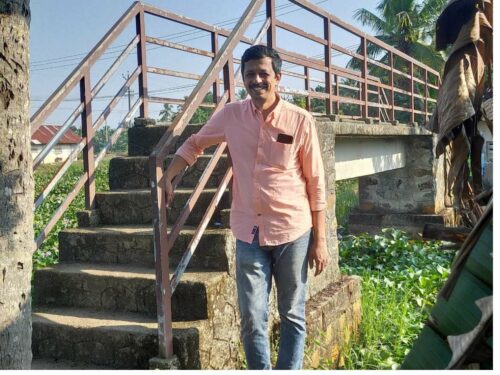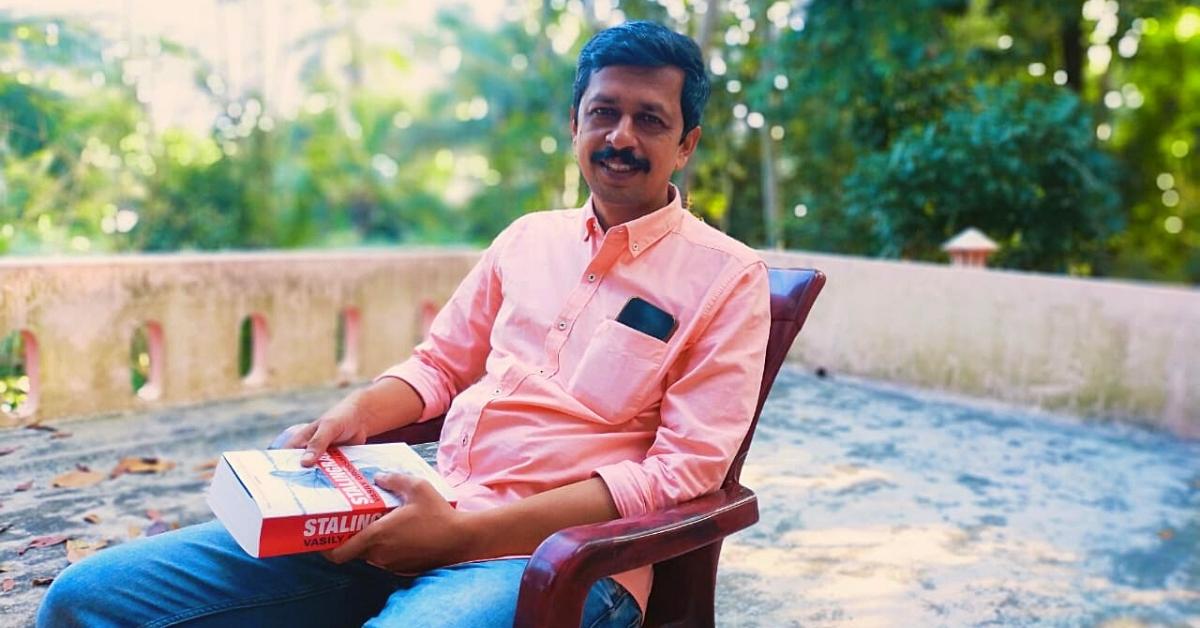S. Hareesh is the assistant village officer at Neendoor, a hamlet tucked away in the hills of central Kerala. He’s also the mind behind India’s latest entry to the Oscars, Jallikattu. The film is based on Hareesh’s Malayalam short story Maoist, which he adapted for the screen along with friend and writer R Jayakumar. He also recently won the JCB literary award for Moustache, the English translation of his novel Meesha.
Jallikattu refers to the traditional event of running bulls. But the film is not about the sport itself. It is about the chaos that ensues when a water buffalo escapes a butcher’s hands and the whole village tries to catch it. This main thread interwoven with snippets of the villagers’ lives reveals man’s own bestial side.
The film is set in a village very much like Hareesh’s own. There would often be news about a buffalo that had run amok, with local officials urging people to stay indoors. Hareesh built on these regular happenings to create a dramatic story.
The film was picked as India’s entry to the 93rd Academy Awards by a 14-member committee of the Film Federation of India from a shortlist of 26 films. It is the third Malayalam film after Guru (1997) and Adaminte Makan Abu (2011) to represent India at the Oscar’s.
“Of course I am elated that the film has been chosen as India’s Oscar entry!” Hareesh tells The Better India. “I know it’s going to be an impossibly tough race, but there is still the desire to win.”

Turning Words Into Moving Visuals
Hareesh never imagined that any of his fiction would be turned into a film. In 2018, three stories from his anthology, Aadam, were combined into a film called Aedan by director Sanju Surendran.
Soon after, Lijo Jose Pellissery of Ee.Ma.Yau and Angamaly Diaries fame phoned him about making a film based on another piece in the same anthology.
They became friends, developing their vision and screenplay for the movie over months. They roped in Jayakumar and the trio would meet every week to work on the script.
“We had a lot of fun writing it,” Hareesh says, enthusiastically.
The most challenging aspect of converting his short story into a screenplay was ridding it of all backstories, exposition, and thoughts. Everything that happens has to be shown visually.
Despite writing the screenplay, the author was really surprised by the end product. It’s not at all the film he had pictured in his head.
“And that’s the magic of creating something like a film. At every stage, each person adds their own transformational touch to the project,” Hareesh says.
And his favourite moment in the film (spoiler alert!) is when the beast is being lifted out of a well by a huge crowd. As it comes out, its eyes meet those of an old man who is watching the concerted yet chaotic effort from a distance.
He did not elaborate on its significance as the author prefers to leave “interpretations open to the audience.”
How Jallikattu Diverges From The Short Story
Like most literary film adaptations, Jallikattu has significant differences from Maoist. And for good reason, says Hareesh.
“Just like I used an ordinary occurrence as inspiration for my story, the director is free to use my story as fodder for his film. Ultimately, a film is the director’s work and vision,” explains the writer.
In Hareesh’s short story, two animals (a buffalo and a bull) escape from the butcher. But because buffaloes and bulls are so hard to tell apart on the screen, they decided to use just one buffalo in the film.
There are also thematic differences. While the tone of Maoist is extremely satirical, Jallikattu is less so, focusing more on mob behaviour. The initial part of the short story speaks of how the buffalo reached the village all the way from Andhra Pradesh, but the movie starts off on the day of its planned slaughter.
A Message For Aspiring Writers
“Writing is like a personal quest, so I cannot really offer any guidance or words of advice,” Hareesh says, adding, “But I will say this much: Write honestly.”
He admits to not writing much when he was in school or college, but he says he used to read a lot. He studied Malayalam literature and took up a government job. Only then, at the age of 22, did he pen his first short and send it off to a magazine. He kept working as an assistant village officer and published when he could. But thanks to his recent literary success, he is on leave from his government job and writes full-time these days.
Between short stories, novels, and screenplays, the novel is his favourite form. However, among his own works, the one he likes the most is a short story called Appan. His latest undertaking is a film titled Churuli, a Malayalam science fiction film, also directed by Lijo Jose Pellissery.
Seems like they make a winning team! We, at The Better India, wish them the very best for their Oscar run.
(Edited by Yoshita Rao)
If you found our stories insightful, informative, or even just enjoyable, we invite you to consider making a voluntary payment to support the work we do at The Better India. Your contribution helps us continue producing quality content that educates, inspires, and drives positive change.
Choose one of the payment options below for your contribution-
By paying for the stories you value, you directly contribute to sustaining our efforts focused on making a difference in the world. Together, let's ensure that impactful stories continue to be told and shared, enriching lives and communities alike.
Thank you for your support. Here are some frequently asked questions you might find helpful to know why you are contributing?

